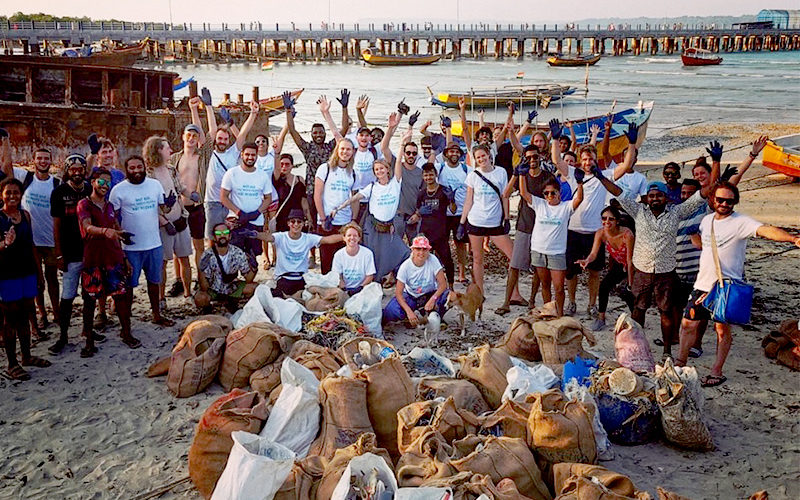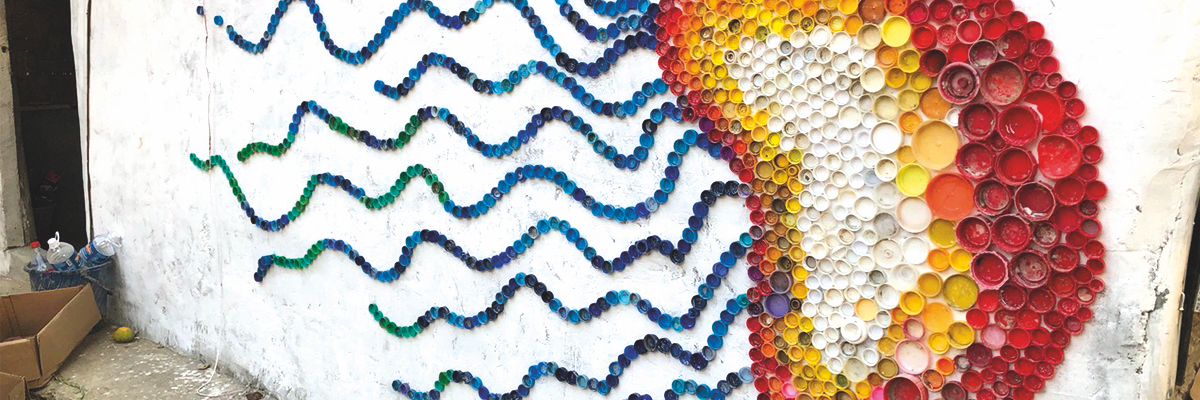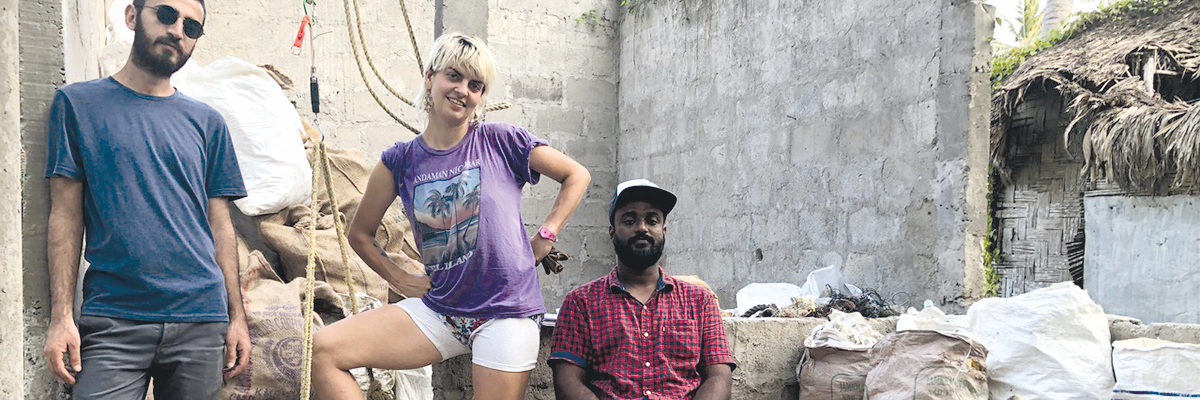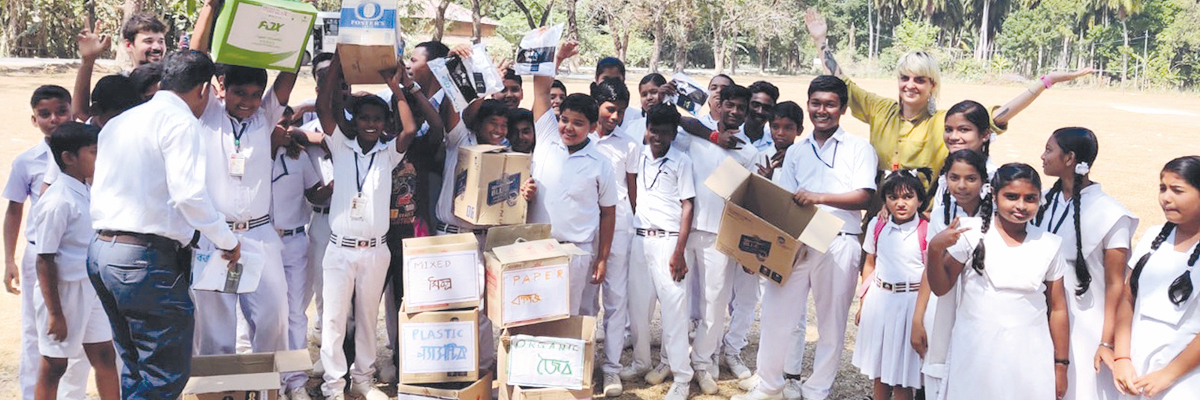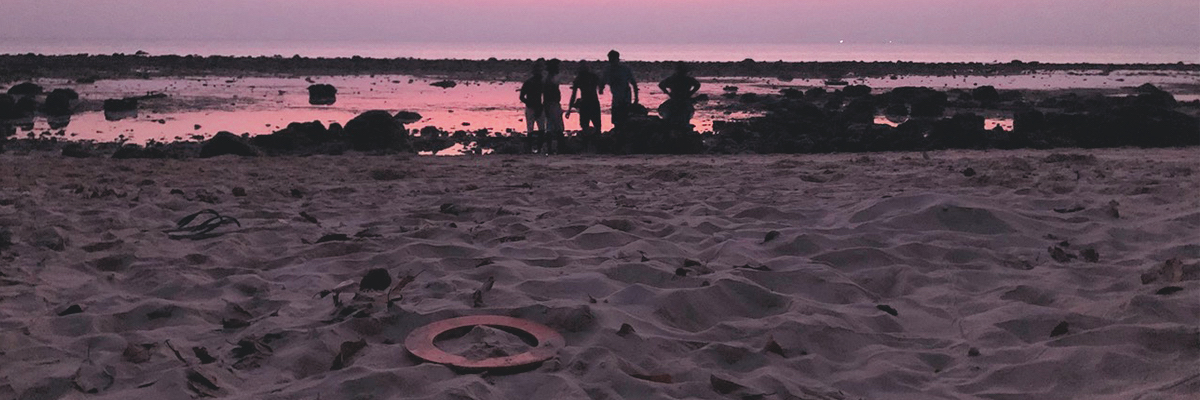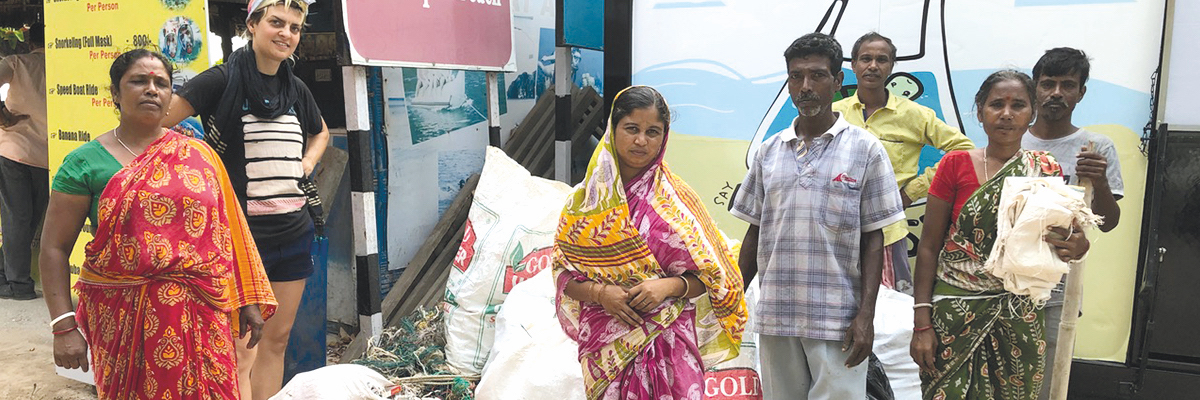Graduate student Daniela and PhD student Katleen conducted research projects on the topic of waste management in India with support of IGCS. Of special interest were studies on the amount and composition of waste, as well as its recycling potential in Chennai and on Neil Island. Sadly, both of them had to end their exchange early due to the Corona virus. Nevertheless, they have achieved a lot during this time and let us take part in their journey, research interest and the implications the virus has on their projects!
Katleen, Berlin School of Economics and Law
Project: Baseline study on solid waste management generation and characterisation on Shaheed Dweep
At the IGCS Winter School in Chennai about Sustainable Waste Management in February 2019, I got inspired to continue research on waste issues as an IGCS research scholar. I was back at IIT Madras in October 2019 to start my research project under the guidance of Prof. Ligy Philip from the Civil Engineering Department at IIT Madras. Two months later I started my field work on the Andaman islands.
Driving forces for my research were
- acquiring knowledge on the amount of waste being produced by whom and what on the islands and
- identifying recycling potential to lessen the burden of the waste’s impact on the islands.
Neil Island, now called Shaheed Dweep, in the South Andamans was research area. The island is dominated by the tourism industry now. The relation about waste generation from local vs. tourist activities is an important indicator about the impact of tourism on small islands.
I chose to conduct a baseline study on Shaheed Dweep for my research project. Realizing that there are no actual figures about waste generation on the island, data collection on the island’s waste generation and the characterization of waste became an important target of my research project. Streamlining the island’s waste becomes a necessity in order to identify recyclable materials which can be transported out of the island. A resource recovery process could take place in Port Blair or on mainland India. The big advantage would be to reducing the burden on the open dumping yard on the Shaheed Dweep, which is currently the prevailing method of waste disposal.
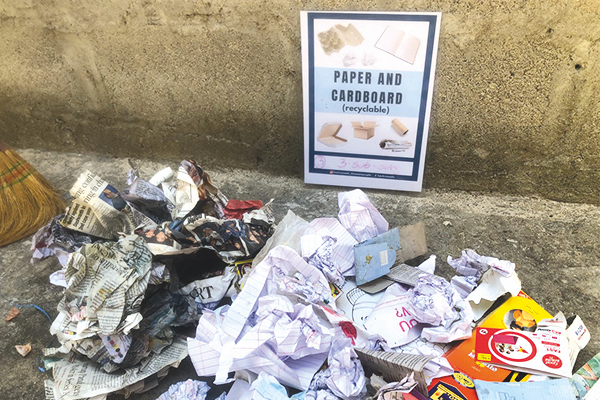
Source: Katleen Schneider 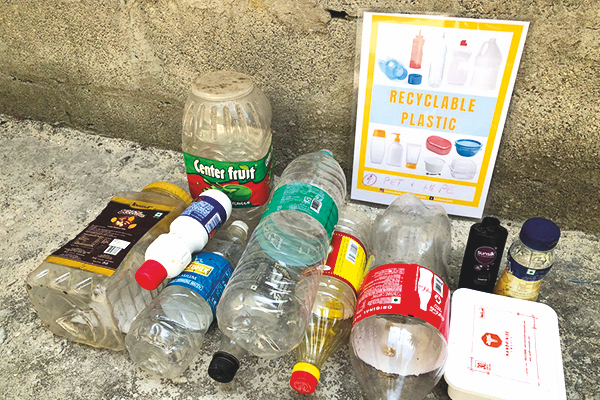
Source: Katleen Schneider
Having said this, the restrictions following the COVID-19 crisis hit me during my second sampling week in March which I conducted with many volunteers to measure and sort the waste from the local market. Tourists were restrained from traveling to the Andamans, water sport activities like diving had to stop and suddenly the petrol station closed overnight. The waste collector changed their collection plans or even stopped collecting. End of story: I was escorted from the Andamans on the following Monday and my second sampling week unfinished. I was leaving the islands in confusion and a state of shock.
What happened next? I stayed in Chennai to continue analyzing my data. My sampling of household data was completed successfully. The waste rate per capita per day has been calculated for the sampling group of merely 0,18 kg/per person/day. Now extrapolating it to the total island inhabitants counting 3.040 people (Gram Panchayat Shaheed Dweep, 2019), the daily waste generation of all registered islanders would be at approximately 550 kg/day. This is a very small share (29%), given the estimation of about 1,9 metric tons per day of mixed waste by the Andaman Public Work Department in 2015. When looking at the composition of waste it reflects the Indian high standard of wet waste or compostable share (65%), while the remaining waste is coming as plastics (11,2%), glass (6,8%), paper (6,6,%), textiles (5,2%), metal (2,1%), hazardous waste (1,7%), other/rubber (1%) and e-waste (0,3%). My goal is now to close the data gap and get the respective figures for the market, the hotels and beach areas, which are the remaining major sources of waste streams on Shaheed Dweep.
Besides that, I enjoyed my time on the island with a diverse range of activities related to a sustainable waste management approach and data collection. Together with local and visiting volunteers, we removed 3,8 tons of waste from the beaches and one private property within three months. Out of this, 36% could be sent to Port Blair to recycle glass and plastic bottles. Furthermore, I conducted a workshops with school children about waste categorization, a waste management stall for the local island festival, a waste mural piece from plastic caps and many beach clean ups.
Heading off to the Andamans with the ferry was not only a dream come true but also an adventure in itself. I wish to return later this year to continue what I had to leave suddenly overnight on Shaheed Dweep.
Source: Katleen Schneider
Daniela Strittmatter, University of Stuttgart
Research Project: Plastic waste management in coastal areas
Plastic is known as a material with a huge range of applications in nowadays life. Our economy wouldn’t be the same without this reliable and cheap material. But what happens with the increasing amount of plastic material after its life spam…?
That was the question that came to my mind many times within the last years and during my master studies. So I decided to deal with this fascinating topic in my master’s thesis. The main aim of my thesis was to examine, how to improve the plastic waste management system in beach areas of Chennai. I conducted my research together with Professor Dr. Ligy Philip from the Civil Engineering Department at IIT Madras in Chennai and Professor Dr. Martin Kranert from the University of Stuttgart.
The research area of my research project is Chennai, a city with around 8,7 million inhabitants in India’s southeast. Similar to many other cities, Chennai is facing increasing amounts of waste, generated by society and companies. Due to an insufficient waste management infrastructure and lacking numbers of waste treatment plants, around 94% of the waste mixture is either deposited on open dumpsites without proper treatment or thrown away illegally. Uncollected waste that reaches coastal areas is likely to enter the sea, leading to negative long-term effects on a sensitive ecosystem. This is especially of increasing concern as the amount of plastic debris in underwater environments continues to accumulate with expected long-term effects on animal and human well-being.
As there is a lack of literature about the current waste composition at beaches in Chennai, I started my research with a status-quo waste analysis at different beach areas. This was an important step in order to gain a first impression. The waste analysis included both the amount and composition of waste, with a focus on plastic. Especially the questions “What is the amount of plastic waste that can be recycled?” and “Which areas are prone for plastic accumulation and why?” were of high interest for me. Luckily, many helpful hands at IIT Madras helped me with my sampling collection as I found many kilograms of waste per sampling site.
One main challenge was the hot and humid weather in Chennai, especially during noon at the sampling sites. With the sun burning down on my helpers and me, it was often quite exhausting to collect and transport the samples at the beach for hours. Nevertheless, I enjoyed being outside and was proud seeing the clean beach areas in the evening. Unfortunately and with a heavy heart, I flew back to Germany with a heavy heart due to the unpredictable Corona-crisis. I wasn’t able to collect further samples anymore due to the lock-down in whole of India. Nevertheless, I am glad to have finished my basis data which I’ll continue to use in an adopted way for my project now that I am back in Germany.
Besides writing my master’s thesis one exciting experience was my participation at the Winter School about “Sustainability in the Peri-scene” at IIT Madras in February 2020, organized by IGCS. The main content of the Winter School was to give the participates a well-rounded understanding of the peri-urban development in Chennai by having lectures, panel discussions, exercises and project work. Apart from the gained content knowledge the Winter School gave great opportunities to build a network with people of the same interest background and I am happy to still be in contact with many of them. Another highlight of my stay was during a beach clean-up I did on my own. Suddenly, a local person appeared, showed interest in my project work and offered to help me without any requirements. It was great to see that people are aware of the waste problem and the negative environmental effects and are willing to do something against it if they get the chance.
All in all I really enjoyed my stay in India. It’s a diverse, colourful and lively country and there are many things to discover. During my travels I enjoyed beautiful landscapes with rice paddies, white sand beaches and tea plantations. I fell in love with the tasty exotic fruits and delicious spicy dishes. Luckily friends taught me how to prepare Indian food. Especially the friendliness and curiosity of Indians made it very easy to get integrated into the Indian way of living and to feel home in Chennai soon. In order to get an impression of all facets of India, it is important to be open-minded and be ready for new experiences because India is also a country of contrasts. In some areas the effects of poverty and luxury can be seen next to each other and this can be challenging to cope with sometimes. Although it is visible that there is effort to improve the waste management situation in the cities, there is still a long way to go and solutions to be found. In order to enhance sustainable systems and thinking, international cooperation bonds like IGCS are a great way to exchange relevant knowledge and experiences between India and Germany and to bring research further for both sides.
Hence, I am very thankful for the experiences I made during my 3,5 months stay in Chennai and would highly recommend the exchange program to interested students. I will definitely come back to visit my friends and to discover the beautiful western and northern parts of India.

